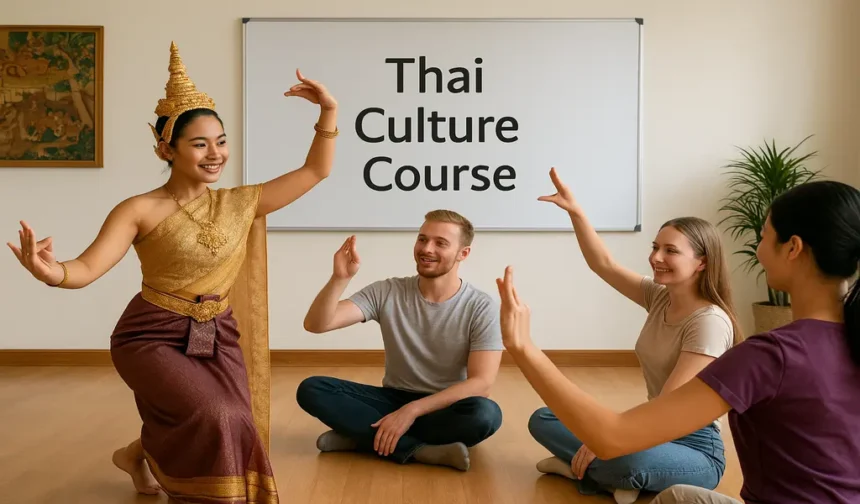Introduction
If you have ever dreamed of understanding Thailand beyond its beaches and street food, a Thai culture course is your gateway. These programs dive into the country’s deep traditions, spiritual practices, arts, and customs. Whether you are moving to Thailand, planning an extended trip, or simply curious about Southeast Asian cultures, such a course provides a structured and enjoyable way to learn.
By exploring Thai traditions, cultural heritage, and everyday etiquette, you gain insights that help you connect with locals and appreciate the country on a deeper level.
What Is a Thai Culture Course?
Definition and Purpose
A Thai culture course is an educational program designed to introduce learners to the history, values, and practices of Thailand. It combines lectures, hands-on workshops, and cultural immersion activities.
Who Should Take It?
- Expats and travellers wanting to adjust smoothly
- Students of Southeast Asian studies
- Professionals working with Thai partners
- Culture enthusiasts eager to expand their knowledge
Benefits for Travellers and Expats
- Build respectful relationships
- Navigate daily life with ease
- Enjoy authentic Thai experiences
SEE ALSO: Chiang Rai Night Bazaar: A Complete Guide to the City’s Lively Night Market
Understanding Thai Traditions
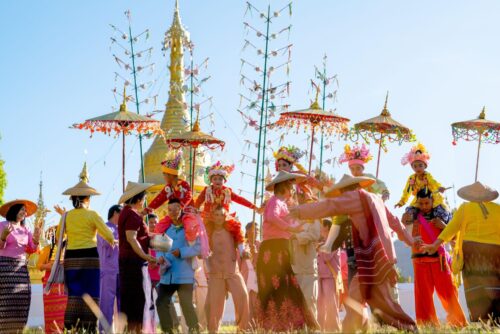
Cultural Heritage Overview
Thailand’s cultural heritage blends ancient customs with modern influences. From rituals and ceremonies to artistic expressions, every tradition carries meaning.
Family Life and Values
Thai family life emphasizes respect for elders, loyalty, and harmony. Family bonds are central to cultural values.
Social Etiquette and Manners
- Wai greeting (palms pressed together)
- Removing shoes before entering homes or temples
- Respect for monarchy and royal ceremonies
Religion and Spiritual Life in Thailand
Buddhism in Thailand
Buddhism shapes daily life and social conduct. Monks play a respected role in communities, and temples are centers of learning.
Temples and Rituals
- Morning alms-giving to monks
- Temple festivals and ceremonies
- Meditation and chanting
Meditation Practices
Courses often include guided meditation, introducing learners to mindfulness rooted in Thai spirituality.
Thai Festivals and Celebrations
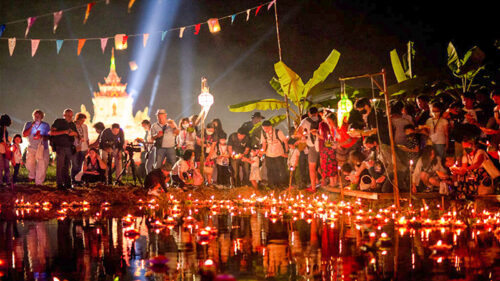
Songkran (Thai New Year)
Known for water-splashing, but at its heart, Songkran is about family reunions and paying respect to elders.
Loy Krathong
Participants float lotus-shaped baskets to honour water spirits and seek forgiveness.
Regional Festivals
Each province highlights regional cultures of Thailand, from lantern festivals to folk performances.
Thai Arts and Creativity
Traditional Thai Arts and Crafts
Courses may include workshops on local crafts and textiles, pottery, or silk weaving.
Thai Dance Lessons and Music Forms
Traditional dance lessons and exposure to music and dance forms bring students closer to Thai performing arts.
Literature and Folklore
Thai folklore and literature reflect spiritual beliefs, royal history, and moral values.
Thai Food and Culinary Customs
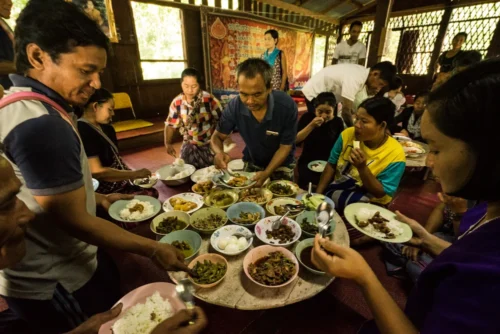
Thai Cuisine Customs
Food is central to Thai culture. Sharing meals symbolizes friendship and hospitality.
Cooking Lessons in a Thai Culture Course
Many programs offer Thai cooking lessons, teaching iconic dishes like Tom Yum soup and Pad Thai.
Food Etiquette
- Don’t place forks in your mouth (use a spoon instead)
- Taste the food before seasoning
- Always offer food to others first
Language and Communication
Thai Language and Scripts
A basic grasp of the Thai language helps learners connect with locals and appreciate cultural nuances.
Importance of Polite Speech
Politeness particles like “krub” and “ka” signal respect and friendliness.
Cultural Immersion Through Language
Language classes enhance overall cultural immersion, making travel and study more rewarding.
Thai Architecture and History
Ancient Temples and Royal Ceremonies
Thailand is dotted with golden temples and palaces that reflect its long history of Thailand.
Thai Architecture Styles
Distinct features include tiered roofs, naga (serpent) motifs, and intricate carvings.
History of Thailand
Courses often cover periods from ancient kingdoms like Sukhothai to modern-day Thailand.
Local Experiences and Cultural Immersion
Chiang Rai Cultural Tourism
Northern Thailand, especially Chiang Rai, offers opportunities for cultural tourism, including temple visits and tribal village stays.
Folk Performances and Authentic Thai Experiences
Students may enjoy folk dances, puppet shows, or Thai cultural exchange events.
Learning from Local Communities
Immersion activities connect learners directly with Thai hospitality and way of life.
Why Take a Thai Culture Course?
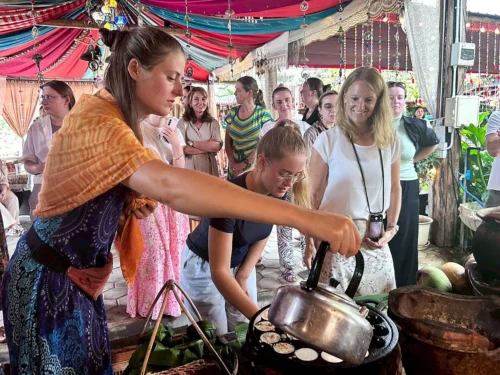
For Students
Deepens academic understanding of Southeast Asian studies.
For Professionals
Improves cross-cultural communication and builds business relationships.
For Travellers and Digital Nomads
Enhances cultural appreciation and makes everyday experiences smoother.
How to Enroll and What to Expect
Course Structure
Most courses combine lectures, field trips, and workshops.
Online vs. In-Person Workshops
- Online courses: Flexible, accessible worldwide
- In-person workshops: Immersive and interactive
Tips for Success
- Stay open-minded
- Participate actively
- Respect local customs
Conclusion
A Thai culture course is more than just a class. It is a doorway into Thailand’s traditions, spirituality, arts, and everyday customs. Whether your interest lies in Thai cuisine, festivals, or meditation, such a program enriches your journey and helps you build meaningful connections. If you plan to visit or live in Thailand, enrolling in a course will give you confidence and cultural awareness.
Take the step today — explore a Thai culture course and unlock the beauty of Thailand’s heritage.
FAQ
1. What is included in a Thai culture course?
It usually covers Thai traditions, etiquette, Buddhism, language basics, and arts. Some include cooking or dance workshops for hands-on learning.
2. How long does a Thai culture course last?
Programs vary from one-day workshops to semester-long studies. Short courses are perfect for travelers, while longer ones suit expats and students.
3. Do I need to speak Thai to join?
No. Most courses are taught in English. However, some include Thai language immersion lessons to enhance understanding.
4. Is a Thai culture course useful for business professionals?
Yes. It helps professionals understand social etiquette, communication styles, and cultural values, which are essential in Thai business settings.
5. Can I take a Thai culture course online?
Yes. Many institutions offer online cultural workshops covering history, festivals, and Thai spirituality.
6. Where are the best places to study Thai culture in Thailand?
Bangkok, Chiang Mai, and Chiang Rai are popular, with universities and cultural centers offering structured programs.
7. What makes a Thai culture course different from travel guides?
Unlike guides, these courses provide deeper insights, structured learning, and cultural immersion activities with locals.





